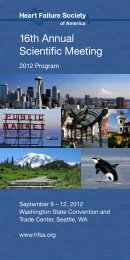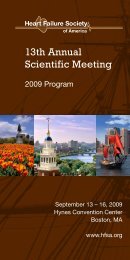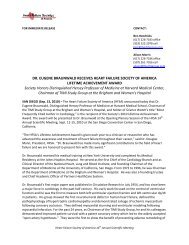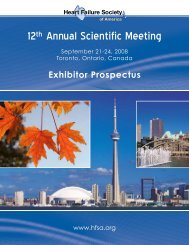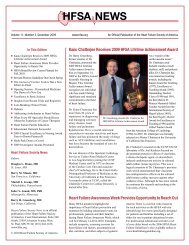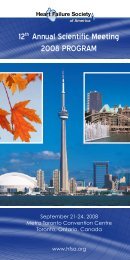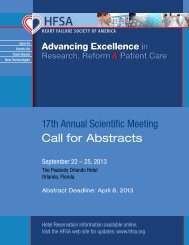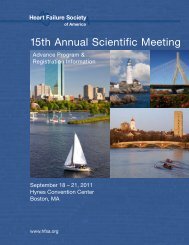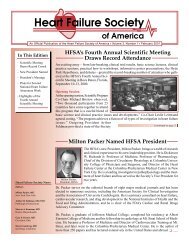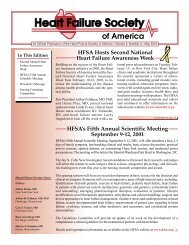15th Annual Scientific Meeting - Heart Failure Society of America
15th Annual Scientific Meeting - Heart Failure Society of America
15th Annual Scientific Meeting - Heart Failure Society of America
You also want an ePaper? Increase the reach of your titles
YUMPU automatically turns print PDFs into web optimized ePapers that Google loves.
CREDIT STATEMENTS<br />
<strong>Scientific</strong> Program<br />
Physicians: The <strong>Heart</strong> <strong>Failure</strong> <strong>Society</strong> <strong>of</strong> <strong>America</strong> is accredited by the<br />
Accreditation Council for Continuing Medical Education to provide<br />
continuing medical education for physicians.<br />
The <strong>Heart</strong> <strong>Failure</strong> <strong>Society</strong> <strong>of</strong> <strong>America</strong> designates this live activity for a<br />
maximum <strong>of</strong> 23.5 AMA PRA Category 1 Credits. Physicians should only<br />
claim credit commensurate with the extent <strong>of</strong> their participation in the activity.<br />
Nurses: This program has been approved by the <strong>America</strong>n Association<br />
<strong>of</strong> Critical Care Nurses (AACN) for 23.5 contact hours, Synergy CERP<br />
Category A, File number 00017263.<br />
Satellite Symposia: September 18 (Sunday)<br />
Physicians: The <strong>Heart</strong> <strong>Failure</strong> <strong>Society</strong> <strong>of</strong> <strong>America</strong> (HFSA) is accredited<br />
by the Accreditation Council for Continuing Medical Education to provide<br />
continuing medical education for physicians. The HFSA designates this<br />
live activity for a maximum <strong>of</strong> 2.0 AMA PRA Category 1 Credits.<br />
Physicians should only claim credit commensurate with the extent <strong>of</strong> their<br />
participation in each program.<br />
Nurses: Each program has been designed to meet Minnesota Board <strong>of</strong><br />
Nursing continuing education requirements and is acceptable for 2.0<br />
contact hours <strong>of</strong> continuing education.<br />
Satellite Symposia: September 19 (Monday)<br />
Physicians: The <strong>Heart</strong> <strong>Failure</strong> <strong>Society</strong> <strong>of</strong> <strong>America</strong> (HFSA) is accredited<br />
by the Accreditation Council for Continuing Medical Education to provide<br />
continuing medical education for physicians. The HFSA designates this<br />
live activity for a maximum <strong>of</strong> 1.0 AMA PRA Category 1 Credits.<br />
Physicians should only claim credit commensurate with the extent <strong>of</strong> their<br />
participation in this program.<br />
Nurses: Each program has been designed to meet Minnesota Board <strong>of</strong><br />
Nursing continuing education requirements and is acceptable for 1.0<br />
contact hour <strong>of</strong> continuing education.<br />
CME Certificates Available On-Site<br />
Presenter/Planner Disclosure Information<br />
The <strong>Heart</strong> <strong>Failure</strong> <strong>Society</strong> <strong>of</strong> <strong>America</strong> has a disclosure policy that<br />
requires oral presenters to disclose whether or not they have relevant<br />
financial relationships with any commercial interest and whether or<br />
not <strong>of</strong>f-label or investigational drug/device use will be discussed.<br />
All oral and poster presenters’ disclosure information received is<br />
listed in the HFSA Presenter/Author Disclosure Booklet. A booklet<br />
is in each meeting congress bag. In addition, each oral presenter will<br />
have a disclosure slide at the beginning <strong>of</strong> his/her presentation.<br />
<strong>Scientific</strong> Program Learning Objectives<br />
Following this meeting, participants will be able to:<br />
1. Describe the epidemiology <strong>of</strong> HF, including environmental factors,<br />
and implement strategies for the prevention <strong>of</strong> HF.<br />
2. Describe current knowledge about the scientific basis <strong>of</strong> HF at the<br />
levels <strong>of</strong> cardiovascular physiology, neurohormones, tissue factors,<br />
and molecular biology and genetics.<br />
3. Identify the findings <strong>of</strong> basic science and current clinical trials and<br />
their implications for current and future HF therapy.<br />
4. Implement optimal guideline-based therapeutic options for HF,<br />
including pharmacologic agents, non-pharmacologic options, such<br />
as diet and exercise; and devices.<br />
5. Manage comorbidities including hypertension, diabetes, and<br />
cognitive issues.<br />
6. Demonstrate awareness <strong>of</strong> psychosocial, economic and ethical<br />
issues in the treatment <strong>of</strong> patients with HF.<br />
7. Implement strategies for effective management <strong>of</strong> the patient with<br />
HF, incorporating the family, encouraging self-care, and employing<br />
the medical home model.<br />
8. Outline strategies for transitioning patients from impatient to<br />
outpatient and for reducing hospital readmissions.<br />
9. Engage in performance measurement and other site-based research.<br />
<strong>Scientific</strong> Session and Satellite Symposia learning objectives are<br />
listed at the end <strong>of</strong> each session in the program book.<br />
CME CERTIFICATES (SCIENTIFIC AND SATELLITE<br />
SESSIONS) WILL BE AVAILABLE ON-SITE. PLEASE<br />
VISIT THE CME KIOSK IN REGISTRATION AREA TO<br />
DOWNLOAD AND PRINT YOUR CME CERTIFICATE(S).<br />
All main entrances to meeting rooms for the scientific sessions<br />
and the satellite programs will be “gated” to capture attendee<br />
information. This is the only information that will be used to<br />
verify attendance for credit certificates. Please make sure you<br />
enter each session through a gated entrance.<br />
10 11



